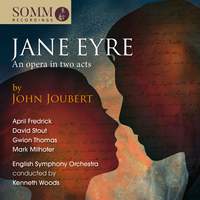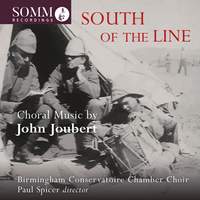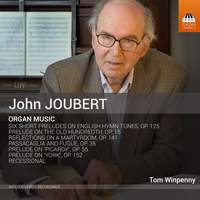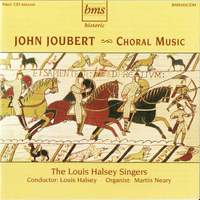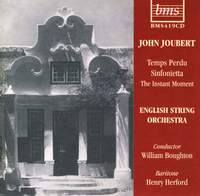Interview,
John Joubert at 90
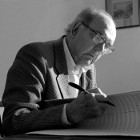 Many people will know the name of John Joubert, if only as the composer of an ever-popular Christmas carol that has been doing sterling service ever since Carols for Choirs 1 was first published - but this veteran musician (who recently turned 90 and is showing no signs of slowing down) has composed a huge number of works in all sorts of genres.
Many people will know the name of John Joubert, if only as the composer of an ever-popular Christmas carol that has been doing sterling service ever since Carols for Choirs 1 was first published - but this veteran musician (who recently turned 90 and is showing no signs of slowing down) has composed a huge number of works in all sorts of genres.
One of the most notable is his opera Jane Eyre - recorded for the first time by Somm Records and released last month. I took the opportunity to ask John about this labour of love, whose long-awaited appearance on disc is a fitting tribute for his birthday milestone.
Your big triumph this year is surely the recording of your opera Jane Eyre, which you’ve been working on for nearly three decades. Did you ever start to feel that this work would never see the light of day?
It’s not quite true to say that I’ve been working on Jane Eyre for three decades. But, started in the 1980s and completed in the 1990s, it was nearly thirty years before it received its premiere - a concert performance recorded and now released on the SOMM label. I always thought that in today’s world the chances of a staged premiere were slim because, unlike the majority of my works, it hadn’t been written to a commission. It was entirely due to the initiative of Siva Oke of SOMM that the concert premiere took place at all. As it turned out the performance was an excellent one and I am delighted that both critical and audience responses have been very positive.
You’ve composed a number of novel-based operas before – Conrad’s Under Western Eyes and Eliot’s Silas Marner. Do you feel particularly drawn to this process of adaptation? Does it pose any particular challenges, compared to writing an opera completely ‘from scratch’?
I can think of very few operas that have been written completely from scratch. Many have been modelled on plays, some on novels, some on legend. Off the top of my head I can only think of Michael Tippett’s later operas (for which he wrote his own libretti) that have no pre-existing material to base them on.
In the three full-length operas you’ve mentioned I selected novels by writers I particularly admire which deal with subjects that I could imagine in operatic terms and with characters whose situations and relationships could be expressed in music. As for challenges, the very idea of writing an opera at all constitutes a challenge of frightening complexity. When you think of it, consider the relatively few that have actually survived into the present-day repertory.
In your interview with Christopher Morley (included in the booklet-notes for Jane Eyre) you mention several influences on you – your falling in, out and back in love again with Wagner, as well as Verdi and of course the ever-present shade of Britten. Were there any particular moments in the opera where you searched for inspiration from other composers’ works?
There are influences in Jane Eyre, of course. Most composers have at one time or another been influenced by some other composer they particularly admire. In my case I think my admiration for Verdi’s later operas - Aida, Otello or Falstaff - is evident, particularly in the way it has been put together rather than the actual musical style. But I think this was an unconscious process rather than a deliberate search for inspiration.
To many, you’re mostly known as the composer of the ever-popular Christmas carol Torches, and the anthem O Lorde, the Maker of Al Thing. Do you feel these two popular works, which both have a rather austere, quasi-medieval sound-world, are a fair representation of yourself as a composer?
Yes, I think they are both fair representations of myself as a composer at the time they were written i.e. in the early 1950s when I was still in my twenties. Oddly enough, I feel they belong more to a cosmopolitan tradition rather than a specifically Anglican one. I hear touches of Bartók and Stravinsky in them rather than Vaughan Williams or Howells. But I have travelled a long way in the intervening decades, much as I still love them both.
Since your 80th birthday celebrations you’ve composed several new works including the large-scale English Requiem, as well as putting a Third Symphony together from elements discarded from this opera. Do you have any plans for further major compositions?
I have no set plans for for further major compositions, but who knows? If somebody came forward to offer me a major commission with a substantial fee and a suitably distant deadline I might well be tempted…
Joubert: Jane Eyre
April Fredrick (Jane Eyre), David Stout (Rochester); English Symphony Orchestra, Kenneth Woods
'Joubert’s music is harmonically attractive and his orchestration subtle. There is also wit, with echoes of the operatic music of Janáček, Britten, Stravinsky and Wagner (to name but a few) evident fleetingly, and intentionally so in their contexts. It would certainly bear repeated listening.' (Classical Source)
Available Formats: 2 CDs, MP3, FLAC, Hi-Res FLAC
Recent and related recordings of John Joubert's work
Joubert: South of the Line
Nicholas Wearne (organ), Birmingham Conservatoire Chamber Choir, Paul Spicer
'This is a diverse collection of choral pieces by a master composer. All the music on this disc…is very fine indeed…This is a fine tribute to John Joubert as he marks his ninetieth birthday.' (MusicWeb International)
Available Formats: CD, MP3, FLAC, Hi-Res FLAC
'Reflections on a Martyrdom from 1997 [is] brilliantly played here by Tom Winpenny. Attractive preludes on English hymn tunes and a thundering Passacaglia and Fugue make this a must for any aficionado.' (The Observer)
Available Formats: CD, MP3, FLAC, Hi-Res FLAC
'I am mightily impressed by the quality of inspiration on show. …all these performances are as convincing as they are dedicated; presentation, too, is admirable.' (MusicWeb International)
Available Formats: CD, MP3, FLAC
Joubert: Temps Perdu, Sinfonietta and The Instant Moment
Henry Herford (baritone), English String Orchestra, William Boughton
'I am mightily impressed by the quality of inspiration on show. …all these performances are as convincing as they are dedicated; presentation, too, is admirable.' (MusicWeb International)
Available Format: CD


